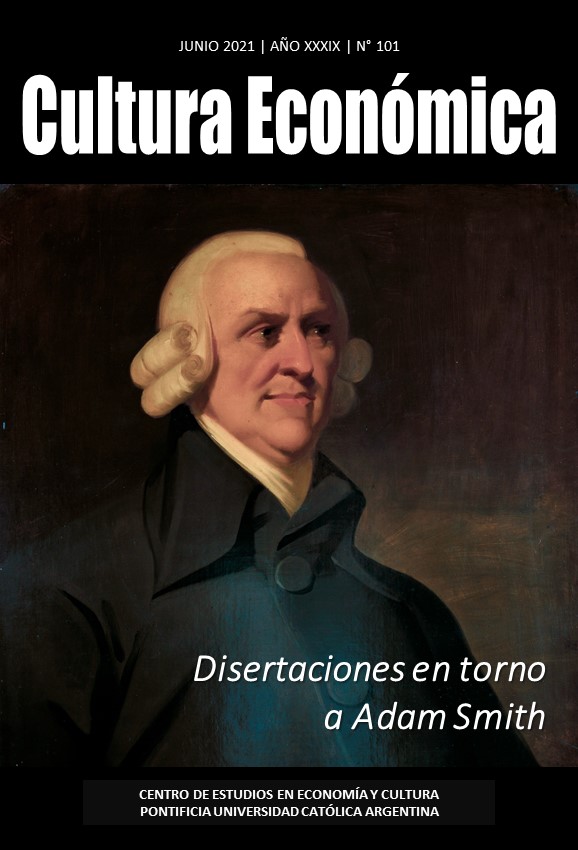The conciliation between virtue and commerce in Adam Smith
DOI:
https://doi.org/10.46553/cecon.39.101.2021.p85-103Keywords:
ADAM SMITH, UNINTENDED CONSEQUENCES, VIRTUE, TRADEAbstract
In this article we will show that according to Adam Smith, virtue and commerce stimulate each other mechanically and accumulatively. Although we might think that they are opposing questions because commercial activity pursues profit and not virtue, we will see that Smith not only reconciles both question, but also shows that they are complementary, that one requires the other and reinforces it. To demonstrate this, we will begin by treating the own nature of this mechanism that links virtue and commerce, differentiating them from other mechanisms. To show this, we will work on the notion of unintended consequences proposed by Merton and the contributions of his co-workers. Then, applying this mertonian conception, we will reconstruct the economic mechanism according to which Adam Smith links virtue and commerce. Finally, we will conclude by doing a detailed analysis of prudence as a virtue it promotes and the same time is promoted by trade.Downloads
References
Bellolio, C. (2019). “La mano invisible y el relojero ciego: los límites del paralelo Smith-Darwin”. Economía y Política, 6(1), 5-29.
Carrasco, A. (2004). “Reinterpretación del espectador imparcial impersonalidad utilitarista o respeto a la dignidad”. Revista Hispanoamericana de Filosofía, 46(137), 61-84.
Cristiano, J. (2011). “Acciones y resultados”. Revista Internacional de Sociología, 69(2), 354-369.
Dickey, L. (1998). “Historicizing the ‘Adam Smith Problem': Conceptual, Historiographical, and Textual Issues”. Journal of Modern History, 58(3), 579-609.
Griswold, Ch. (1999). Adam Smith and the Virtues of Enlightenment. New York: Cambridge University Press.
Hume, D. (1998). Tratado de la naturaleza humana. Madrid: Tecnos.
Hurtado Prieto, J. (2003). “La teoría del valor de Adam Smith: La cuestión de los precios naturales y sus interpretaciones”. Cuadernos de economía, 22(38), 15-45.
Lord Kames (1971). Essays on the Principles of Morality and Natural Religion. Edimburgo: printed by R. Fleming, for A. Kincaid and A. Donaldson.
Meek, R. L. (1981). Los orígenes de la ciencia social. El desarrollo de los cuatro estadios. Madrid: Siglo XXI.
Merton, R. (1936). “The Unanticipated Consequences of Purposive Social Action”. American Sociological Review, 1(6), 894-904.
Smith, A. (2012). Investigación sobre la naturaleza y causa de la riqueza de las naciones. México D.F: Fondo de Cultura Económica.
Smith, A. (2013). La teoría de los sentimientos morales. Madrid: Alianza.
Smith, A. (2018). Consideraciones sobre la formación original de los lenguajes. Oviedo: KRK ediciones.
Smith, A. (1995). Lecciones sobre jurisprudencia. Granada: Comares.
Smith, A. (1998). “Los principios que presiden y dirigen las investigaciones históricas”. En Ensayos filosóficos. Madrid: Ediciones Pirámide.
Wences Simon, M. I. (2006a). Sociedad Civil y virtud cívica en Adam Ferguson. Madrid: Centro de estudios políticos y constitucionales.
Wences Simon M. I. (2006b). “Adam Ferguson y la difícil articulación entre el comercio y la virtud”. Polis: Revista Latinoamericana, N° 14.
Downloads
Published
How to Cite
Issue
Section
License













